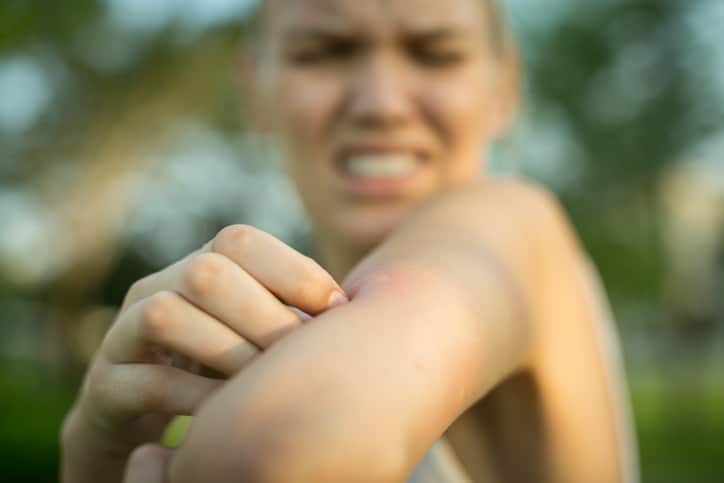Practicing sun safety during the hottest months of the year comes pretty naturally. However, some of us neglect to practice bug safety. “Bug safety” may sound silly, but it’s easy to forget how dangerous insect bites can be–especially during the summertime when we’re all enjoying the outdoors. Here are some things to keep in mind as we head into the warm-weather months when it comes to bug bites.
Most mosquito bites are harmless. However, some mosquito bites can transmit diseases that can cause severe illness with symptoms like headache, high fever, and bodily weakness. Ticks can also transmit disease. Lyme disease can be treated if diagnosed early. Some signs of this tick-borne illness are flu-like symptoms and possible rashes. If left untreated, Lyme disease can cause joint and muscle pain, fatigue, heart problems, and neurological issues.
Here are some tips for preventing insect bites. Throughout the summer, you can protect your family against the illnesses these insect bites bring.
Preventing Bug Bites
- Don’t apply perfumes and avoid the use of scented soaps. The sweet scents of soaps and perfumes attract some insects.
- Stay away from stagnant water and heavily wooded areas. Insects, especially mosquitoes, congregate around pools of water. Deer ticks, which carry Lyme disease are more likely to be in areas with lots of trees and brush.
- Check DEET concentrations on insect repellents before use. Higher concentrations of DEET protect for longer lengths of time. Choose a concentration based on how long you need to protect yourself. Repellents containing DEET should not be used on children younger than six months old and be sure to avoid contact with your mouth and eyes.
- Dress appropriately if you plan to be in a wooded or grassy area. Pants and long sleeves are best and are an excellent way to limit your skin exposure. Once you’re back inside it’s a good idea to shower. Not only will this wash away the repellent, but it may also wash away any ticks that haven’t yet latched onto your body. You’ll also want to be sure to check your entire body thoroughly for ticks (especially your ears, waist, head, belly button, arms, and legs).
- Resist walking barefoot in the grass. Bees can often be on the ground and this will help you avoid being stung. It’s also wise to avoid perfumes and bright colors, as these may attract bees.
- Protect your pets, too. Your four-legged family members can also get diseases from insects. Make sure to bring and use your pet’s flea and tick repellants.
Bug Bite Treatment
- Treat your bites. If you do get bitten and develop a bite that is red or raised try: 1) applying an ice pack for 10-15 minutes 3-4 times a day and 2) taking Benadryl for itching will both provide symptomatic relief from the local insect bite reaction. Bites rarely develop into a skin infection (cellulitis), but this usually takes several days. If there is any question, call your doctor to have it evaluated.
- Know the signs of having a potentially dangerous anaphylactic (rapidly progressing allergic) reaction to a bite. Reactions are most commonly associated with stings by bees, wasps, or hornets. Hives, swelling (of the face, eyes, tongue, and lips), throat tightness, difficulty breathing, vomiting, or feeling faint/lightheaded are all signs of potentially dangerous anaphylaxis, and you should contact your doctor immediately or call 911.
We hope you are able to enjoy your summer and avoid unwanted bug bites and infection! If you need us, you can walk-in anytime to any of our KidsStreet Urgent Care or MainStreet Family Care Clinics.

